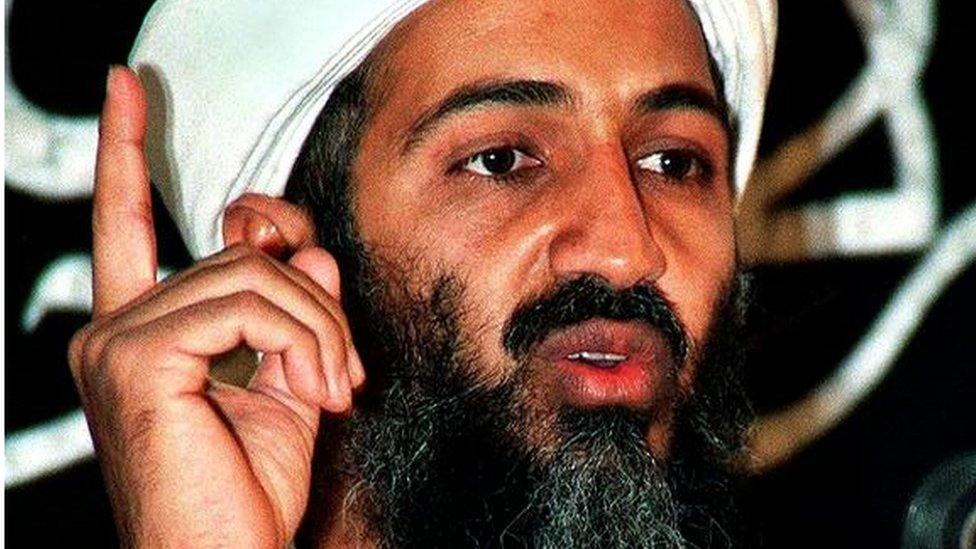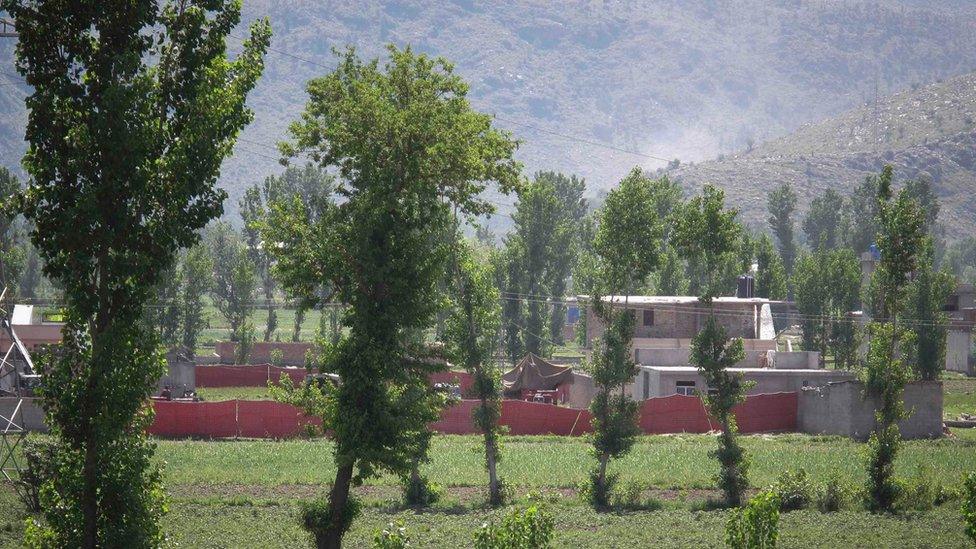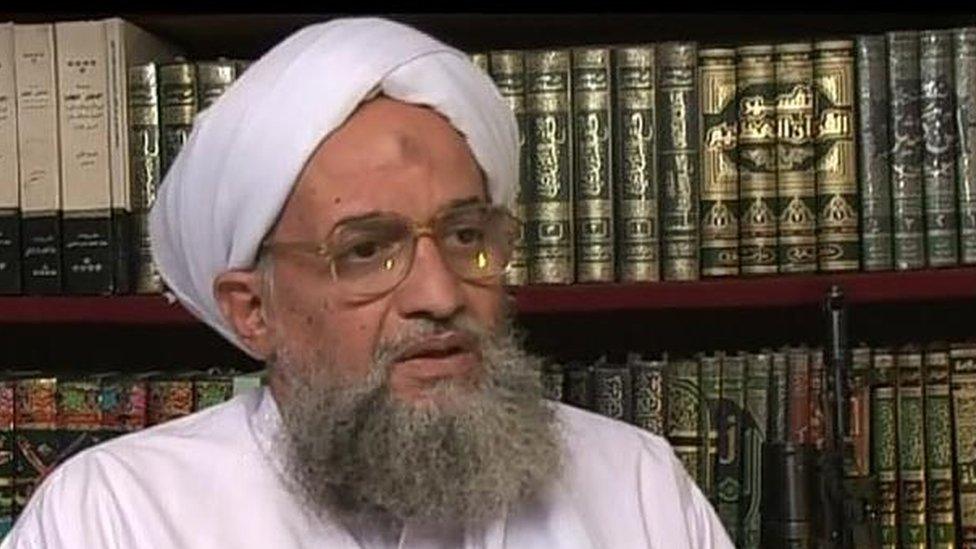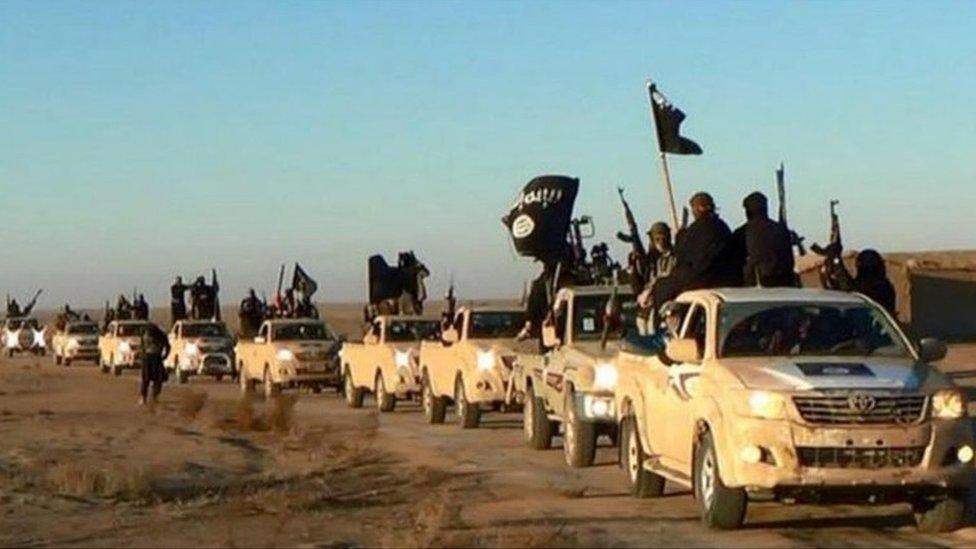Does Bin Laden's death leave a lasting legacy?
- Published

Osama Bin Laden was the leader of al-Qaeda and was killed by US forces in 2011
Monday marks exactly five years since Osama Bin Laden, the man branded "the world's most wanted terrorist" was cornered and killed by US Navy Seals in a villa in Pakistan.
For the US, this highly secret operation, conducted without informing the Pakistan government, was both payback and a form of closure for the 9/11 attacks of 2001.
For Pakistan, it was both a national insult and an embarrassment.
Bin Laden, or "OBL" as he became known in the West, had been discovered living comfortably just 31 miles (50km) from the capital, Islamabad, and almost under the nose of Pakistan's Military Academy in Abbottabad.
But five years on from that dawn raid, later dramatised by Hollywood in the film Zero Dark Thirty, violent jihadism is still very much a global phenomenon.
The last 12 months have seen jihadist attacks on almost every continent - in Europe, America, the Middle East, South East Asia and Africa.
So how much of this is Osama Bin Laden's legacy and what will be his lasting impact, if any, on the world?
How the lives of Osama Bin Laden's neighbours changed forever
Bin Laden: The long hunt for the al-Qaeda leader
Was Bin Laden still in charge of al-Qaeda?
In pictures: Osama Bin Laden's life
Bin Laden files: Seven things we learned
"Bin Laden's death did leave a legacy," says Dr Sajjan Gohel, of the Asia Pacific Foundation, "but to some extent, it has been usurped by Isis (so-called Islamic State, also known as IS) who have taken over and built on his goals for creating a transnational terrorist project".

The al-Qaeda leader was tracked down to this compound in Abbottabad
To many people, the 22-year-long era of Bin Laden's al-Qaeda from 1989 to 2011 might not seem that different from the violent ideology of today's IS.
Both groups have espoused a narrow-minded, intolerant version of the Islamic religion, casting anyone - even other Sunni Muslims - as apostates if they do not share their world view.
They both use suicide bombings and mass murder of civilians as tactics and they both reject the concept of democracy as being incompatible with Sharia, Islamic law.
Longer-term strategy
Yet they are different and if OBL - or Abu Abdullah as he was known to his followers - were alive today he would almost certainly have disapproved of the actions and timing of IS.
Bin Laden's strategy was a patient, long-term, generational one. He was hoping that 9/11 and other spectacular attacks would so demoralise the US and the West that they would abandon their support for secular Arab regimes in the Middle East, paving the way for an eventual takeover by jihadists and the creation of an Islamic caliphate.
He saw this as being perhaps decades away and probably not in his natural lifetime.
Even before his death, there were indications that OBL and the al-Qaeda leadership in Pakistan disagreed with the extreme violence being employed by al-Qaeda's Iraqi franchise which went on to become the modern-day IS.

Osama Bin Laden:
Born in 1957, apparently the 17th of 52 children of Mohamed Bin Laden, a multimillionaire builder responsible for 80% of Saudi Arabia's roads
Inherited millions of dollars after his father died in a helicopter crash in 1968
Radicalised while studying civil engineering at King Abdul Aziz University in Jeddah, Saudi Arabia
Fought with the Afghanistan mujahideen against the invading Soviet forces from 1979
Appalled by the stationing of 300,000 US troops in Saudi Arabia during the 1991 Gulf War against Iraq
Implicated in the 1993 bombing of the World Trade Center in New York, a 1995 car bomb in the Saudi capital Riyadh and a truck bomb in a Saudi barracks, which killed 19 US soldiers.
Issued a fatwa - or religious edict - in February 1998 stating that killing Americans and their allies was a Muslim duty
Chief suspect behind the bombing of the US Embassies in Kenya and Tanzania later that year, which killed hundreds
Thought to have played a key role in masterminding the attacks of 11 September 2001, which killed nearly 3,000 people

"IS has gone in different directions from Bin Laden's al-Qaeda," says Dr Gohel.
"It deliberately kills Sunni Muslims, including women and children. (IS has carried out several mosque bombings in Saudi Arabia, killing Sunni and Shia alike).
"It also engages in criminal activity, human trafficking and is open to recruiting women, all of which al-Qaeda was opposed to."

Dr Ayman al-Zawahiri is not a dynamic public performer
Years from now, historians will most likely conclude that the death of Osama Bin Laden in that pre-dawn US raid on 2 May 2011 dealt a near-fatal blow to the organisation he came to represent.
His successor, Dr Ayman Al-Zawahiri, is a dull, bespectacled Egyptian ideologue devoid of charisma.
His long, wordy speeches are in marked contrast to the snappy use of social media and the internet by today's generation of IS operatives.
The controversial CIA-run programme of drone strikes in Pakistan's Tribal Territories has kept what is left of Bin Laden's organisation constantly looking over its shoulders, inhibiting its ability to plan a repeat of the London bombings.
Al-Qaeda's regional franchises, like Al-Shabaab in Somalia and AQAP in Yemen, have largely been left to develop by themselves.
Watershed moment
Richard Clarke, who was President George W Bush's counter-terrorism chief until 2003, believes that regardless of what followed, the death of Bin Laden marked a watershed.
"I think there was a propaganda effect right away," he says.
"As long as he was alive, the Americans looked impotent but the longer term effect (of his death) was that al-Qaeda Central, their headquarters, never really recovered. Al-Qaeda as a multinational organisation doesn't really exist."

Islamic State favours more extreme action even than Bin Laden's al-Qaeda
Yet without such a single, identifiable target as OBL, today's IS presents a more diffuse and difficult target for the US to hit.
Its leader, Abu Bakr al-Baghdadi, rarely surfaces and IS will have anyway planned long ago for his demise.
In recent days, the US presidential hopeful Donald Trump has vowed to destroy IS, without saying how.
But as the global effort grinds on to defeat or at least contain violent Islamic extremism, the absence of such a charismatic figure as OBL was to his followers makes it unlikely that such a decisive one-off moment as his death five years ago will ever be repeated.